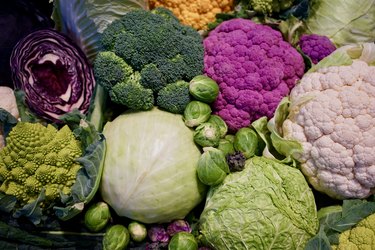
The female sex hormone estrogen helps usher in puberty, regulates your menstrual periods and even keeps your bones and heart strong, among other functions, but too much can lead to a host of problems. Tweaks to your diet might help.
Too Much Estrogen?
Video of the Day
More estrogen than you need can result in weight gain, menstrual problems, extreme premenstrual syndrome, non-cancerous breast lumps, fatigue, low libido, depression and anxiety, among other symptoms, according to the Endocrine Society.
Video of the Day
Changing your diet may help improve some of these symptoms. But first things first, cautions Mache Seibel, MD, a Boston-based obstetrician/gynecologist and member of the Harvard University medical faculty. "If you are trying to lower your levels of estrogen, you need a proper diagnosis," says Dr. Seibel, author of The Estrogen Window and The Estrogen Fix.
Talk to your doctor about any symptoms you think may be caused by too much estrogen. "They may not be related to estrogen levels at all," he cautions. Your doctor can also order a blood test to see where you stand, he says.
If your estrogen levels are too high, consuming these six categories of estrogen-blocker foods as part of a healthy, well-balanced diet may help lower them.
1. Edamame
Soybeans are rich in isoflavones, which can act like a weak estrogen in some women and block estrogen in others. "Soy is a smart estrogen, which means it can work as an estrogen or an anti-estrogen, depending on how much of the hormone your body is producing," Dr. Seibel explains. There used to be concern that eating soy, because of its potential estrogenic properties, may increase risk for breast cancer, but studies have largely debunked this theory, according to the Mayo Clinic.
2. Cruciferous Veggies
Crunchy cruciferous vegetables — particularly broccoli, cabbage and cauliflower — contain a high level of phytochemicals that can block estrogen production, Dr. Seibel says. In fact, women who eat a vegetarian diet have up to 20 percent lower blood levels of estrogen than their meat-eating counterparts, according to the University of Wisconsin-Madison School of Medicine and Public Health.
3. Whole Grains
Women who have overweight or obesity have more estrogen because fat cells produce estrogen, Dr. Seibel explains. Fiber makes you feel full faster and can play an important role in weight loss, and whole grains such as brown rice, quinoa, oats and barley are chock-full of fiber.
In addition, a fiber-rich diet decreases the amount of estrogen absorbed and increases the amount of estrogen excreted from the body, notes the University of Wisconsin-Madison. The Academy of Nutrition and Dietetics suggests aiming for about 25 grams of fiber each day.
4. Flaxseeds
These tiny powerhouses are loaded with lignans, phytoestrogens or plant-based estrogens, says Dr. Seibel. Flaxseed might have an anti-estrogen effect, according to the Mayo Clinic. Add a tablespoon of ground flaxseed to your oatmeal each morning to start reaping the benefit today, the Mayo Clinic suggests.
5. Salmon
When you're stressed, your body responds by cranking up production of the stress hormone cortisol, which is made from precursors to another sex hormone called progesterone. This may disrupt the delicate balance of estrogen and progesterone in the body, and it's this imbalance that can lead to weight gain, mood changes and other symptoms of estrogen dominance, Dr. Seibel explains. Cortisol is also inflammatory.
Salmon and other fatty fish are loaded with omega-3 fatty acids that cool inflammation. The American Heart Association recommends that you eat fatty fish — which also include tuna, mackerel, herring and lake trout — at least twice a week to get the anti-inflammatory benefits. Omega-3 fatty acids are also good source of lignans, compounds that may lower or block the effects of estrogen in some tissue, according to the Linus Pauling Institute at Oregon State University.
Read more: Are Canned Salmon & Tuna Good Sources of Omega-3?
6. Mushrooms
Mushrooms may reduce the production of an enzyme called aromatase, which converts the hormone androgen to estrogen, Dr. Seibel says. They are also low in calories and loaded with nutrients, including potassium and B-complex vitamins, such as riboflavin, niacin and pantothenic acid, the Academy of Nutrition and Dietetics states.
- Endocrine Society: “What Is Estrogen?”
- Mache Seibel, MD, obstetrician/gynecologist, medical faculty, Harvard University, Boston
- Mayo Clinic: “Will Eating Soy Increase My Risk of Breast Cancer?”
- Mayo Clinic: “Flaxseed and Flaxseed Oil”
- Mayo Clinic: “Does Ground Flaxseed Have More Health Benefits Than Whole Flaxseed?”
- University of Wisconsin-Madison School of Medicine and Public Health: “Estrogen Dominance Clinical Tool”
- Academy of Nutrition and Dietetics: “Fiber”
- Academy of Nutrition and Dietetics: “Fun With Funghi: Garnish Your Meals With Mushrooms”
- American Heart Association: “Fish and Omega-3 Fatty Acids”
- Linus Pauling Institute at Oregon State University: “Lignans”
Is this an emergency? If you are experiencing serious medical symptoms, please see the National Library of Medicine’s list of signs you need emergency medical attention or call 911.